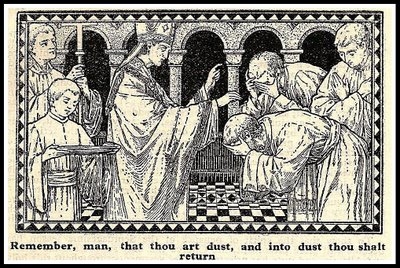When you fast, be not as hypocrites, of a sad countenance. (Benedictus antiphon)
Grant, O Lord, that Thy faithful may begin the solemn days of Lent with fitting piety and may persevere therein with steadfast devotion.
 What do you think would count as evidence of our Christian faith? What surely mark us believers in God who loves and sustains us? Can you identify the point of a relationship with the Incarnate God?
What do you think would count as evidence of our Christian faith? What surely mark us believers in God who loves and sustains us? Can you identify the point of a relationship with the Incarnate God?
“The person believes in and is devoted to the person of Jesus Christ
and accepts Jesus as Lord and Savior.
An understanding that some suffering is a part of life
and that crosses have to be carried under difficult circumstances.
A conviction that our life here is only a small part of our life,
that this is not as good as it gets –there is a resurrection for each one of us.
A commitment to be a person of forgiveness —
A commitment to non-violence and justice for others
A fundamental respect and love for people and for all of creation.
A lively sense of the presence of Christ in our world,
in the poor, in the sick, in the weak, in the prisoner,
in those who are hungry and thirsty, in the stranger,
in short, that Christ is present in those whom our world disregards, and would just like to get rid of.
 Does this sound radical? Difficult? Off the edge?
Does this sound radical? Difficult? Off the edge?
It is, all of the above.
Fortunately, Christians are not born, they are made.
They are made by the work of the Holy Spirit.
From ashes to fire –from Ash Wednesday to Pentecost –the whole Church,
not just me as an individual in my own little box,
the whole Church prays and works with those
who are preparing for baptism at the Easter Vigil.
And the fifty days of Easter are a time when
Christians savor the readings about the early Christian churches
and the blessings of the gift of the Holy Spirit.
This whole span of days from Ash Wednesday to Pentecost
is a special time of formation for Christians?
Easter and Pentecost are about our death and resurrection in Christ,
our Passover from death to life in his Passover,
through water and the Holy Spirit in baptism.
Lent is our annual retreat,
our annual re-entry into the catechumenate,
in order to reflect on, affirm, remember,
and re-claim that baptism.
For baptism is the sacramental center out of which we live.
It is the watery Spirit-filled womb and tomb
to which we are called to return time and time again.
Becoming a Christian means stability in Christ our Rock,
but always being on the move;
sure of our identity in Christ,
but still always seemingly wet from the waters of baptism.
Sometimes when we think of Lent we think of penance.
And penance, to our modem sensibility, has a negative, pinched quality about it.
However, penance comes from the Latin
paenitentia that comes from the Greek metanoia.
And metanoia means to change one’s heart, one’s mind.
It means to be converted.
It means claiming the full meaning of being baptized into Christ;
claiming that new birth, and the gifts of the Holy Spirit.
If there ever was a person who made baptism the very center of his life,
it was Martin Luther.
When he was plagued by doubt, or tempted to despair,
he would trace the sign of the cross on his forehead and say, “I have been baptized.”
No matter what happened, through Christ God had claimed him.
As you sign the forehead of the person next to you with ashes,
you are reminding the person
that no matter what happens,
he or she has been claimed by God through baptism.
Each one of us wants to live the Gospel in such as a way
that it is crystal clear that Christ is the center of our existence.
Abbot John Klassen, OSB
The Abbey of Saint John